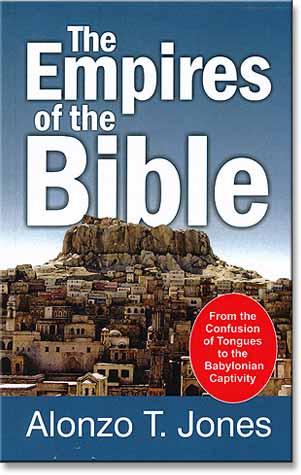A. T. Jones
From the Confusion of Tongues to the Babylonian Captivity
History, properly studied, is truly the study of the grand purposes of God with men and nations. History, studied on this basis and with the guidance of the Bible, proves itself to be one of the richest fields of true philosophy. The philosophy of the Bible is the philosophy of history; and the philosophy of sin and salvation is the philosophy of the Bible. History has not much value except as it teaches us of sin and salvation.
The peopling of the earth by the sons of Noah is the origin of the nations in the world: “By these were the nations divided in the earth after the flood;” and “of them was the whole earth overspread.” This is the true record of the peopling of the earth, and there is no other. Without this the history of any people must lack that essential part — the true beginning. Whoever studies the 10th chapter of Genesis will know the true origin of every people and nation of the world.
Government was first by the individual. There was no State, no territorial lines. But apostasy grew and prevailed, and inevitably, the despotism in man grew and asserted dominion over others, culminating in Nimrod’s ambition, not only for kingship, but for empire and dominion. Men were subject to power merely because they happened to be in the territory claimed by the would-be monarch.
Nimrod’s ambition was continued by others in that day, and has been continued even to today: the ambition of rulers rising into empire, dominating the world for a season, and falling before the rising of anther of the same kind is largely the history of the world. Nimrod began it, and others continued it: Shinar, Chaldea, Elam, Karrak, Accad, Babel, early Assyria, Egypt, later Assyria, and Babylonia.
Each succeeding empire set itself against the plainly stated philosophy of their Creator. God directly manifested Himself to each empire, calling them to the way of righteousness, and finally personally showing them, and introducing them to The Way to righteousness through the gift of Christ. In light of this, how is it possible to understand history without the Bible? Without the study of history in light of the Bible, it is a one-sided history — and one-sided on the wrong side.
Join the author as he constructs a history of nations, from the Tower of Babel, including the history of Israel and the surrounding kingdoms, until the Babylonian captivity. Using research conducted in Babylon and Egypt, this book includes many valuable and historical records inscribed in stone by the very men living in those ancient times. The facts of history have been recorded as the events unfolded, but considering those facts in light of the true philosophy of the Bible gives the reader a completely different view. With the truth of the Bible, the real reason for the succession of empires can be discerned, and the meaning of events in the reigns of many kings. History from the standpoint of true philosophy includes the marches, the battles, the sieges, the rise and fall of powers, but is more far-reaching than these things, and brings to light the deeper meaning, and the lessons learned are of far higher value.
Facsimile reproduction from the 1904 original, including a series of 21 maps which trace the course of the empires described. The unique design of this book will be useful to every student, either of the Bible or history.
“History, therefore, with its dusty and moldering pages, is to us as sacred a volume as the book of nature; because history properly studied is truly the stody of the grand purposes of God with men and nations” —Alonzo T. Jones, Empires of the Bible.
Paperback, 410 pages.
Contents:
I. The Origin of Nations
II. The Sons of Japheth
III. The Sons of Ham
IV. The Sons of Shem
V. The Gods of the Nations
VI. The Beginnings of Kingdoms
VII. The Egyptian Empire
VIII. The People of Israel
IX. The Kingdom of Israel — Saul and David
X. The Empire of Israel — Reign of David
XI. The Empire of Israel — Reign of Solomon
XII. The Ten Tribes — Reign of Jeroboam
XIII. Judah — From Rehoboam to Asa
XIV. The Ten Tribes — From Nadab to Jehu
XV. Judah — Fro Asa to Ahaziah
XVI. The Ten Tribes — From Jehu to the End of the Kingdom
XVII. Judah — From Athaliah to Hezekiah
XVIII. The Assyrian Empire — Tiglath-Pileser I and Assur-natir-pal I
XIX. The Assyrian Empire — Reign of Shalmaneser II
XX. The Assyrian Empire — From Samas-Rimmon to Assur-narari
XXI. The Assyrian Empire — Pul and Tiglath-Pilesar III
XXII. The Assyrian Empire — Reign of Sargon
XXIII. The Assyrian Empire — Reigh of Sennacherib
XXIV. The Assyrian Empire — Reign of Esar-haddon
XXV. The Assyrian Empire — Reign of Assur-bani-pal
XXVI. End of the Assyrian Empire
XXVII. The Captivity of Judah




